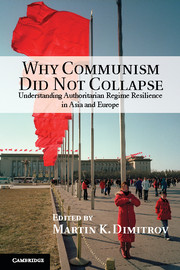Book contents
- Frontmatter
- Contents
- Tables and Figures
- List of Contributors
- Acknowledgments
- Abbreviations
- Part I Reform and Resilience
- Part II Ideology and Resilience
- Part III Contagion and Resilience
- Part IV Inclusion and Resilience
- Part V Accountability and Resilience
- 9 Vietnam through Chinese Eyes
- 10 Vertical Accountability in Communist Regimes
- 11 Conclusion
- Miscellaneous Bibliography
- General Bibliography
- Index
- References
9 - Vietnam through Chinese Eyes
Divergent Accountability in Single-Party Regimes
Published online by Cambridge University Press: 05 August 2013
- Frontmatter
- Contents
- Tables and Figures
- List of Contributors
- Acknowledgments
- Abbreviations
- Part I Reform and Resilience
- Part II Ideology and Resilience
- Part III Contagion and Resilience
- Part IV Inclusion and Resilience
- Part V Accountability and Resilience
- 9 Vietnam through Chinese Eyes
- 10 Vertical Accountability in Communist Regimes
- 11 Conclusion
- Miscellaneous Bibliography
- General Bibliography
- Index
- References
Summary
This volume aims to identify the foundations of communist regime resilience. Some chapters focus on economic and political reforms as mechanisms for resilience, others on strategies for inclusiveness, and still others on ideology and legitimacy. We approach this important issue by analyzing formal institutions of horizontal and vertical accountability in China and Vietnam. We find important differences that are becoming more salient over time. Yet both sets of accountability institutions serve these resilient single-party regimes, protecting rather than threatening them.
While our finding supports this volume’s main conclusion that institutional design plays a key role in shaping the form and degree of a regime’s resilience, our comparative cases also show that institutions going by the same name may operate by quite different rules. What is understood as order making in one country may therefore be viewed as a cause of instability in another.
- Type
- Chapter
- Information
- Why Communism Did Not CollapseUnderstanding Authoritarian Regime Resilience in Asia and Europe, pp. 237 - 275Publisher: Cambridge University PressPrint publication year: 2013
References
- 14
- Cited by

